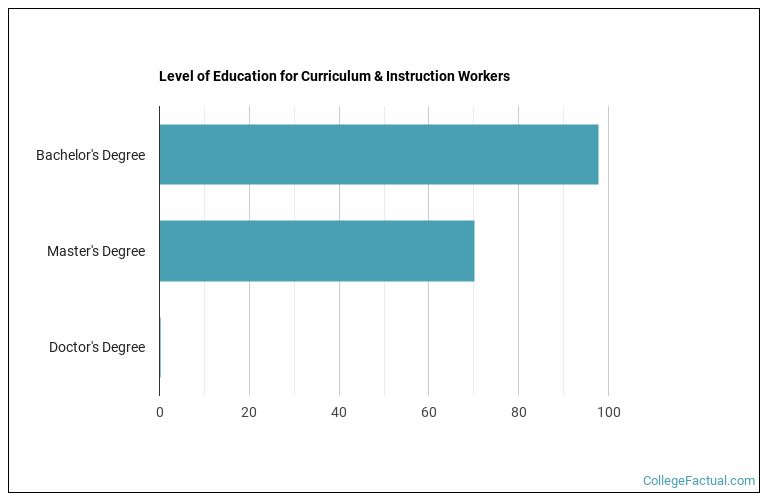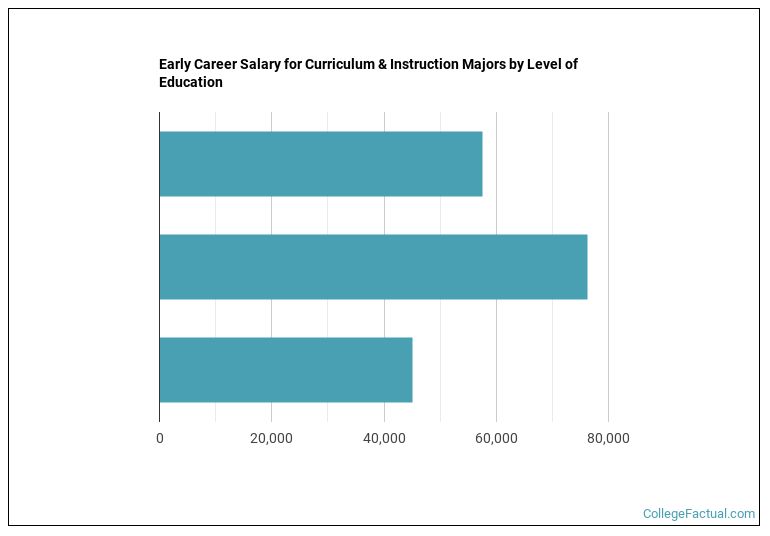 by our College Data Analytics Team
by our College Data Analytics TeamA major in Curriculum & Instruction will give you the tools required to become a Curriculum Specialist. Students will focus on material currently being taught in schools, how it should be taught, and how it aligns to state standards. You will learn the most effective methods of tailoring learning to make it more effective for various subjects, grade levels, and ability levels. You will also learn how to measure the success of curriculums and how they can be improved.
Along with core courses and some education courses, you may take curriculum application, curriculum planning, curriculum evaluation, and curriculum design.
In 2021-2022, curriculum & instruction was the 55th most popular major nationwide with 19,217 degrees awarded. Our 2025 Best Curriculum & Instruction Schools ranking analyzes 169 of these schools to determine the best overall colleges for curriculum & instruction students. Explore this or one of our many other custom curriculum rankings further below.
Those interested in developing curriculum and instruction should be up to date on current teaching strategies and the constantly changing classroom environment. This is so that you can enhance curriculum with your educational expertise and content knowledge.
To be successful in this field, organization, time management and multi-tasking are important qualities. Part of the job includes arranging professional development opportunities for teachers. It will also be your task to train teachers to adjust to the latest technology in their classroom and help them learn how to implement new teaching strategies. You will be a key support in many teachers' lives and will be responsible to help them improve their skills. You cannot be easily intimidated by headstrong teachers; instead you need to be flexible and creative in order to appeal to even the most seasoned teacher. Another task you will manage is the evaluation of the curriculum and teaching methods based on analyzing student test data.
This major appeals to those passionate about learning and education, but who want to take a behind-the-scenes position. As a Curriculum & Instruction major, you will stay up to date with the latest state standards and learn methods of teaching the new standards to those in the education field.
New students will need to have completed high school or a GED program and each school will have their own minimum GPA and SAT/ACT test requirements. In addition to these basic curriculum & instruction program qualifications, to serve in some curriculum careers, special certification may be required outside of your degree.
Curriculum degree levels vary. You can get anything from a in curriculum & instruction to the highest curriculum degree, a . The time it takes to complete a curriculum degree varies depending on the program.
| Degree | Credit Requirements | Typical Program Length |
|---|---|---|
| Associate Degree | 60-70 credits | 2 years |
| Bachelor’s Degree | 120 credits | 4 years |
| Master’s Degree | 50-70 credits | 1-3 years |
| Doctorate | Program required coursework including thesis or dissertation | At least 4 years |
A master's degree is the most common level of education achieved by those in careers related to curriculum, with approximately 62.5% of workers getting one. Find out other typical degree levels for curriculum workers below.
| Level of Education | Percentage of Workers |
|---|---|
| Master’s Degree | 62.4% |
| Bachelor’s Degree | 25.4% |
| Post-Master’s Certificate | 6.0% |
| First Professional Degree | 2.3% |
| Post-Baccalaureate Certificate | 2.0% |
70.1% of curriculum workers have at least a master's. View the chart below to get an idea of what degree level most of those in curriculum & instruction careers have.

The education level required is different depending on the curriculum career you are seeking.
A Curriculum Coordinator will work in a school district and may be hired for specific grade levels or subjects. This will allow you to tailor professional development classes for your particular area. Most school districts will require at least a master's degree in Curriculum and Instruction and some may require a master's degree in your content area. Also, many districts require a minimum number of years as a classroom teacher before becoming a curriculum coordinator.
Want a job when you graduate with your curriculum degree? Curriculum & Instruction careers are expected to grow 10.5% between 2016 and 2026.
The following options are some of the most in-demand careers related to curriculum & instruction.
| Occupation Name | Projected Jobs | Expected Growth |
|---|---|---|
| Instructional Coordinators | 180,400 | 10.5% |
Curriculum & Instruction graduates between <nil> reported earning an average of $58,227 in the <nil> timeframe. Earnings can range from as low as $25,194 to as high as $142,452. As you might expect, salaries for curriculum graduates vary depending on the level of education that was acquired.

Salaries for curriculum & instruction graduates can vary widely by the occupation you choose as well. The following table shows the top highest paying careers curriculum grads often go into.
| Occupation Name | Median Average Salary |
|---|---|
| Instructional Coordinators | $67,490 |
With over 749 different curriculum degree programs to choose from, finding the best fit for you can be a challenge. Fortunately you have come to the right place. We have analyzed all of these schools to come up with hundreds of unbiased curriculum school rankings to help you with this.
Curriculum & Instruction is one of 14 different types of Education programs to choose from.
| Major | Annual Graduates |
|---|---|
| Curriculum & Instruction | 19,217 |
| Related Major | Annual Graduates |
|---|---|
| Teacher Education Grade Specific | 110,770 |
| Educational Administration | 46,975 |
| Teacher Education Subject Specific | 42,343 |
| Special Education | 35,973 |
| General Education | 29,389 |